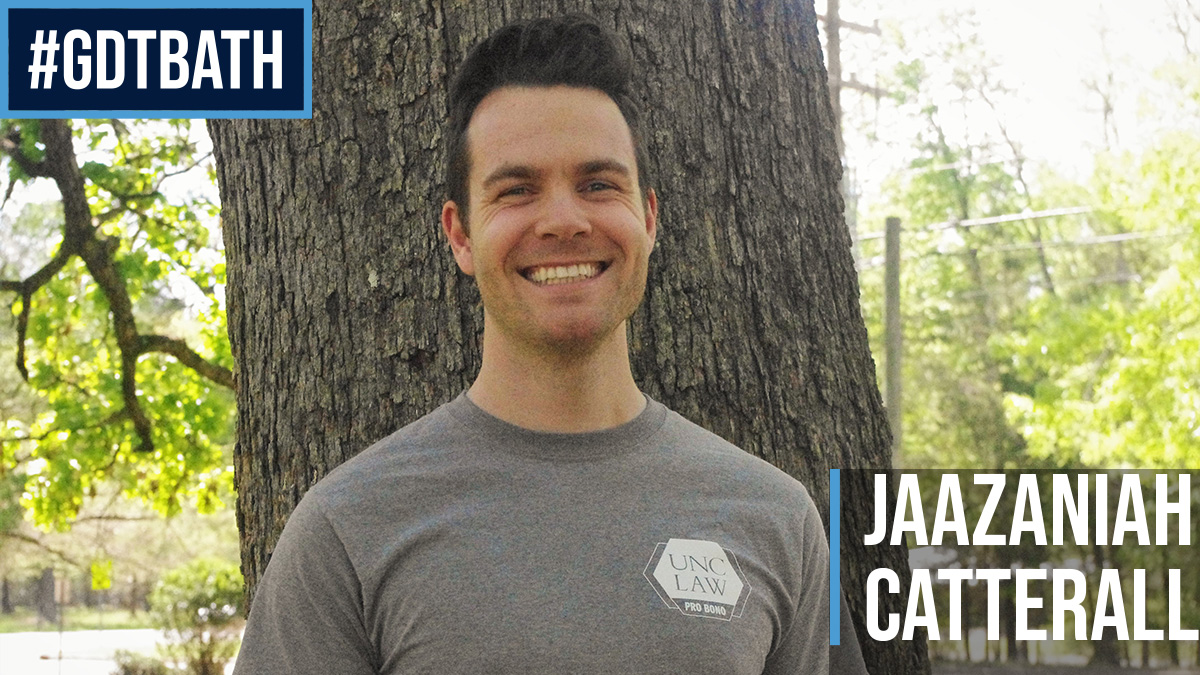#GDTBATH: Jaazaniah Catterall
April 17, 2020As the first-year class coordinator for UNC School of Law’s Pro Bono Program, Jaazaniah Catterall is helping his classmates to use their skills to provide free legal help to North Carolinians.

Jaazaniah Catterall was born into helping. Led by his pastor father, the family moved around, introducing themselves to new communities through their offered service.
“We’d knock on doors, bring food, or we’d help families in need get access to food. We’d take care of kids, help out in whatever way we could,” he said.
As a first-year student at Carolina’s School of Law, Catterall is still helping in whatever way he can. He’s the first-year class coordinator for the school’s pro bono program, encouraging his classmates to use their skills to offer free legal help to the community. So far, he has scaled class-wide participation in the program up to 70%.
“One of the things that drew me to Carolina’s law school is that it wasn’t about just the daily work and assignments. The school is known for service, and I could tell it was an important part of their program,” he said. “So far, the first-year class has done more than 3,000 hours of pro bono legal work. It’s really something when you think about it – that’s all work that attorneys would charge for, but these people could not afford to have. This is meaningful work that couldn’t happen otherwise, and that’s why I came to UNC – to be with students like that.”
During his undergraduate career at Michigan State University, Catterall was interested in history, particularly in the history of change. Law school had never been part of his plan, until his now wife, Lauren, enrolled in the UNC School of Medicine. He began to consider post-graduate studies and learned not only of the law school’s commitment to service but also of the Chancellor’s Scholars Awards, which provide scholarship money to those with a lasting commitment to pro bono and public service.
Catterall has performed more than 100 hours of pro bono work since he started law school last summer, and this past winter break, he joined other law students in a trip to the western North Carolina towns of Morganton, Hickory and Lenoir to provide pro bono estate services, such as drafting wills, for those who couldn’t afford to hire lawyers. He has also used his skills to advocate for children in the social services system and used his research skills to help the N.C. Coalition for Domestic Violence advocate the legislature for measures that support survivors.
His mind is now on the current COVID-19 pandemic, and the opportunities for law students to help those whose needs will be exacerbated by the pandemic or will have new needs arise and few resources to seek help.
“Those who were most at risk before this are still at risk — maybe even more. They will be greatly impacted by COVID-19,” he said. “We can’t forget those who had ongoing needs before, and the pandemic will bring up a lot of new needs. There will be a lot of questions about housing, kids in the foster system, parents who are working hard to see their children, and the list goes on. There’s a lot of work to do, and as lawyers, we can truly make people’s lives better.”
— Courtney Mitchell, University Communications
